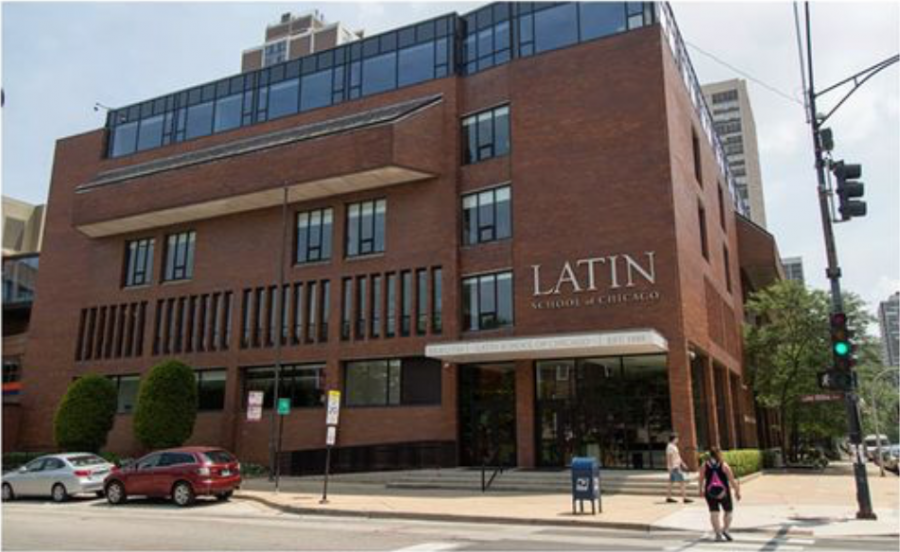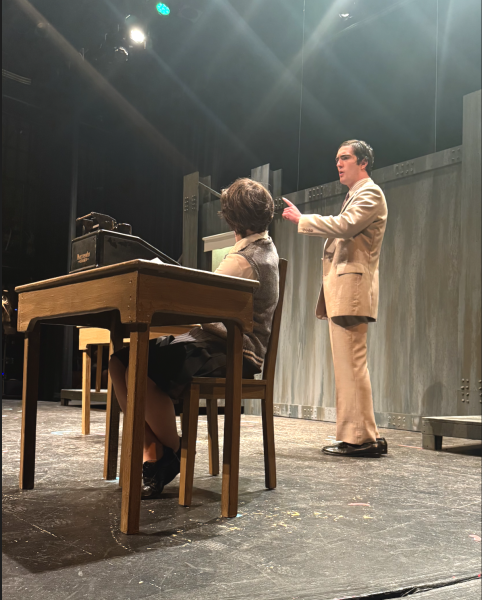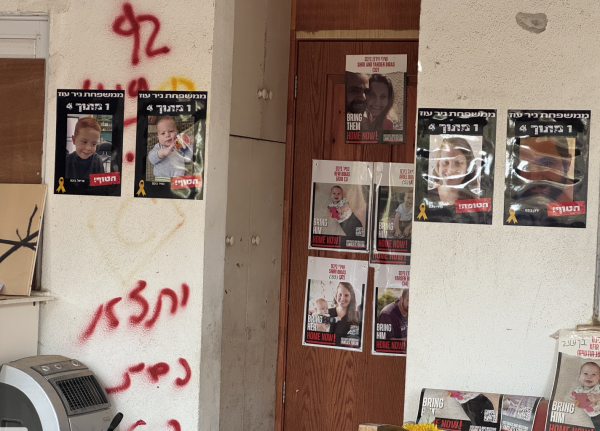Union Vote Set for June 2
The vote will either maintain Latin as we know it, or push the school towards a new horizon.
The Latin School as seen from North Ave
May 7, 2021
Long-simmering tensions between Latin faculty and the administration will come to a boiling point on June 2, when the faculty will vote on whether or not they will form a union. The election on the Illinois Federation of Teachers’ (IFT) petition to represent the Latin faculty is set to take place from 3:30 to 6:30 p.m. at the Latin School Tent in Lincoln Park.
Eligible voters will include assistant teachers and nurses. The decision to include assistant teachers and nurses, made at the end of a National Labor Relations Board hearing this week, is “subject to challenge,” according to the ruling, but it’s unclear how or when this challenge would take place.
Latin’s administration and pro-union faculty disagree on whether assistant teachers and nurses should be represented in the vote. Arguing that nurses and assistant teachers serve in a different capacity than the faculty, the administration fought to have them removed from the group of eligible voters.
Union organizers responded by saying that removing nurses and assistant teachers from the vote “targets some of our most unprotected community members. Assistant Teachers start at $22,000 a year. Nurses regularly work over 12 hours a day. Out of the 28 individuals in these two categories, 24 identify as female. And they are some of our hardest-working colleagues, who faced the greatest risks this last year.”
Including assistant teachers and nurses in the vote could end up being a determining factor in whether supporters of the union will reach the simple majority required to win the election.
Upper School English teacher Lang Kanai, a supporter of the union, feels strongly that assistant teachers should be represented because their salary does not match the amount of work they put into the classroom. “Hearing anecdotally from assistant teachers, sometimes they’ve been asked to teach half the class for a lesson, so that, effectively, they’re doing the job of the classroom teacher, but being paid at or below minimum wage.”
“I don’t see why these assistant teachers who give so much of themselves and so much of the community should be living at the poverty line,” Mr. Kanai said. “That doesn’t seem just.”
In response, Head of School Randall Dunn said, “We understand the importance of compensation for everyone at Latin. Several years ago Latin increased assistant teacher pay, and it is something that we continue to evaluate. We are also very transparent with all assistant teacher candidates regarding the pay structure and benefits prior to accepting the assistant teacher program.”
Mr. Kanai also believes that paying assistant teachers so little inhibits Latin from retaining assistant teachers from more socioeconomically diverse backgrounds. Most of the assistant teachers at Latin are also young women (and women, as Mr. Kanai noted, are already paid only around 80 cents for every dollar a man makes).
“I think Latin could do its part to help correct these sorts of systemic issues by paying these young women in a way that’s commensurate with their energy, with their work, with their labor,” he said.
Mr. Dunn said he understands that Latin still has work to do regarding representation and the diversity of its faculty. “It has been a school-wide challenge for Latin, which is one of the reasons it made our list (actually first on the list) of newly articulated DEI Institutional Goals last fall. Specifically, we hope to hire and retain more faculty and staff of color in every area of the school, including the assistant teacher program.”
Mr. Kanai said he believes that nurses should be included in the vote because of the amount of work they have put into making this year safe. “They are just an essential part of who we are and what we do,” he said. “It would seem odd to have folks like counselors, you know, admissions folks, included in the unit and not nurses, considering how much work they do, how much they interact with students and what their role is in the community in terms of maintaining our health and our health and safety.”
In fact, while the school’s counselors are included in the voting group that the pro-union faculty put together, the admissions staff are not part of that group.
Mr. Kanai said he supports the union for a number of reasons. The first and most commonly cited reason among union supporters is for teachers, assistant teachers, and nurses to have “a seat at the table when critical decisions are being made.” He, as well as many other teachers, were upset that the decision to return to fully in-person learning was made with “no faculty input.” However, he added, “I understand that this year has been impossible in many ways for senior administration. There are so many constituencies that have almost diametrically opposed interests.”
He said the teachers requested meetings and other “avenues of communication” with the administration but felt that the decision on certain issues was already determined by the administration prior to the faculty voicing their opinion.
In response to certain teachers feeling left in the cold when it came to the decision to return fully in-person, Mr. Dunn said, “The voices of faculty members who did not want to return were heard, and I have advocated strongly for those voices when the conditions were different, but at this point, I needed to be an advocate for our students. It was time for their needs to come first. I am confident in the decision and grateful to everyone who worked incredibly hard to make it happen.”
In addition to feeling unheard this year, Mr. Kanai said he was also worried about job security. He said that teachers who have been at Latin for less than four years are on a year-to-year contract. They are, according to Mr. Kanai, “essentially at-will employees and can be dismissed for any reason, which doesn’t lend itself to a feeling of security.” Mr. Kanai said that his decision to support the union is not about improving pay raises, benefits, or working conditions, “because we recognize that Latin is an amazing place to work, and we are so privileged as educators to have small class sizes and a generous benefits package, health care, and retirement compensation.”
In response, Mr. Dunn said, “All teachers in their first four years at Latin are offered one-year contracts. This is common industry practice, and Lab and Parker have similar practices.”
“At Latin,” he added “teachers who have completed four consecutive years of full-time employment and have been recommended for long-term retention will be eligible for a two-year rolling contract at the time of the signing of their fifth contract. All Latin faculty were offered a contract for the 2021-2022 academic year.”
While Mr. Kanai makes fair points regarding job security, those points, seen through a different lens, are also the reason some fear unions; increasing one-year contracts to multiple years (and making other changes to promote job security) also makes it more difficult to fire underperforming teachers.
Mr. Dunn also cautions against the collective bargaining that would come with a union. “If security is the goal, people should be wary of relying on collective bargaining,” he said. “While the employer and the union are required to bargain in good faith, they are not required to agree. Because of that, the outcome of bargaining is unpredictable. While the union likes to claim that they will reduce unpredictability of the future, voting for IFT representation would have the opposite effect. ALL aspects of wages, benefits and ‘other conditions of employment’ will need to be bargained, with no guarantees regarding what the outcome would be. These are the facts of collective bargaining.”
Middle School math teacher Eve Bonneau said she is concerned that the union came about during a pandemic. “Every member of the faculty, staff, and administration has worked tirelessly to make the school a safe learning environment for all. While I agree that there are issues to be addressed, I do not think that the formation of a union is the way to deal with those issues.”
“I have felt safe walking into the school every day since September,” Ms. Bonneau said. “The fact that we in the Middle School have been able to have partial and now full days of in-person teaching and learning has had such a positive effect on the students.”
Ultimately, she believes that “when governed by a union, our individual voice is lost, and the flexibility that we have all come to enjoy is compromised.”
The pro-union faculty and the school’s administration continue to disagree about whether a union would benefit students or work against their interests. A union would have the power to strike if demands were not met, and a strike could have harmful impacts on students and their families—both in childcare and academics.
While good teachers are at the forefront of a quality education, Latin also advocates for a well rounded experience which includes sports, academic enrichment opportunities, theatre, DEI initiatives, and so on. Increasing salaries, for even one group of faculty such as assistant teachers, will require additional changes to restore the school’s financial equilibrium—either cutting costs in one of the aforementioned categories or raising tuition levels.
The vote on June 2 will either maintain Latin as we know it, or push the school towards a new horizon.






















































